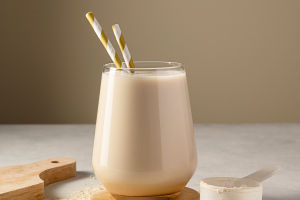
The belief that more protein leads to better muscle growth and weight loss has driven the popularity of protein supplements, chunks, and shakes. But are these products truly beneficial, or could they have drawbacks?
In the early 20th century, Arctic explorer Vilhjalmur Stefansson conducted a series of experiments centered around a diet composed entirely of meat. His diet was roughly 80% oil and 20% protein.
During a year-long study at New York City's Bellevue Hospital in 1928, he repeated this diet. Stefansson aimed to challenge claims that humans couldn’t survive solely on meat. However, consuming only lean meats without oil caused him to develop "protein poisoning," also referred to as "rabbit starvation." His condition improved once he reduced his protein intake and increased oil consumption. Later, after returning to a standard U.S. diet, Stefansson’s health reportedly declined again, prompting him to adopt a low-carb, high-fat, and high-protein regimen until his death at 83.
These experiments represent rare documented cases of the adverse effects of excessive protein consumption. Despite the growing market for protein-rich products, questions remain about how much protein is truly necessary and whether too much or too little poses risks.
The Role of Protein in Modern Diets
Obesity rates have doubled over the past two decades, leading to heightened awareness of dietary choices. Many individuals now opt for healthier options like whole-grain bread or skimmed milk. Protein has become central to these dietary shifts, with protein-enhanced products—ranging from chunks to soups—taking over supermarket shelves. The global protein supplement market, valued at $22.43 billion in 2021, reflects the belief that protein is essential for health and fitness. However, some experts argue that these products may not be worth their often hefty price tags.
Protein and Muscle Building
Protein plays a vital role in repairing and growing the body’s tissues. Foods like meat, fish, dairy, eggs, and beans are rich in protein, which is broken down into amino acids during digestion. The liver then determines how these amino acids are used, with the remainder expelled through body liquid.
For the average grown ups with a relatively inactive lifestyle, the recommended daily intake is about 0.75g of protein per kilogram of body weight. This equates to 55g for men and 45g for women—roughly two palm-sized portions of protein-rich food daily. Severe protein deficiencies, which might lead to symptoms like hair loss or muscle wastage, are rare and typically seen in cases of eating disorders.
Protein’s connection to muscle building is well-established. Strength training breaks down muscle protein, and consuming protein supports its repair and growth. A specific amino acid, leucine, is key to this process. Some experts believe skipping protein after a workout might lead to more muscle breakdown than rebuilding. This has popularized post-workout protein shakes, especially those containing whey protein, a byproduct of cheese production rich in leucine.
Despite the hype, many individuals remain unsure of the tangible benefits. Surveys have shown that while people spend considerable amounts on protein supplements, many question whether these products deliver noticeable results. Research from 2022 suggested protein powder aids in muscle growth and lower-body strength but doesn’t significantly impact other strength tests or reduce muscle soreness after exercise.
For most people, the daily protein requirement is easily met through diet alone. Kevin Tipton, a professor at the University of Stirling, emphasizes that protein supplements are merely convenient and not superior to food. He notes that even for bodybuilders, supplements are often overvalued compared to factors like training intensity, diet, and rest.
Who Needs Extra Protein?
Experts generally agree that protein-rich foods are preferable to supplements, though there are exceptions. Athletes struggling to meet daily protein needs may benefit from protein shakes. Another group requiring more protein is the elderly, who need additional intake to maintain muscle mass. However, reduced protein consumption among older people, linked to a shift toward sweeter food preferences, often complicates this need.
Researchers like Emma Stevenson from Newcastle University are collaborating with food companies to include more protein in snacks commonly consumed by older populations. Recommendations suggest increasing protein intake to around 1.2g per kilogram of body weight for this group.
Protein and Weight Loss
Protein is often associated with weight loss, as high-protein diets, such as Paleo and Atkins, are known for promoting satiety. Hunger frequently derails weight-loss efforts, but studies have shown that high-protein breakfasts can curb cravings later in the day. Alex Johnstone from the University of Aberdeen supports the idea that protein helps with satiety but warns against extreme diets that exclude carbohydrates, which can harm gut health.
Instead, a balanced diet with 30% protein, 40% carbohydrates, and 30% oil is recommended for weight management. Lean protein sources like chicken and fish are ideal, while excessive consumption of red meat has been linked to health risks, including cancer and heart disease.
Non-meat protein sources, like mycoprotein derived from fungi, offer an alternative. Products like Quorn are not only protein-rich but also high in fiber, which may positively impact satiety and insulin regulation. Studies have shown that diets incorporating mycoprotein can improve blood markers associated with lower risks of heart disease and diabetes compared to traditional meat-based diets.
The Healthiest Sources of Protein
Recent research suggests that protein from dairy and plants may provide the most long-term health benefits. A 2024 study of 48,000 nurses found that higher consumption of dairy and plant protein was associated with lower risks of chronic diseases and better mental health in older age. In contrast, animal protein showed links to several chronic conditions. However, the mechanisms underlying these findings remain unclear.
High Protein Diet: Is It Safe? | Nutritionist Explains... | Myprotein
Video by Myprotein
Is Too Much Protein Harmful?
Exceeding protein requirements is challenging for most people. According to Tipton, concerns about protein harming the kidneys or bones in healthy individuals lack substantial evidence. For those with pre-existing kidney issues, excessive protein might pose a risk, but the likelihood is low.
However, protein supplements often contain additives like FODMAPs, which can cause digestive discomfort. Reading labels carefully is advised, as these products can also be calorie-dense, with high sugar content. Consuming more protein than necessary may simply result in wasteful spending, as excess protein is excreted, notes Johnstone.
Ultimately, while the risks of overconsuming protein are minimal, the primary concern may lie in overpaying for products that provide more protein than the body requires.


